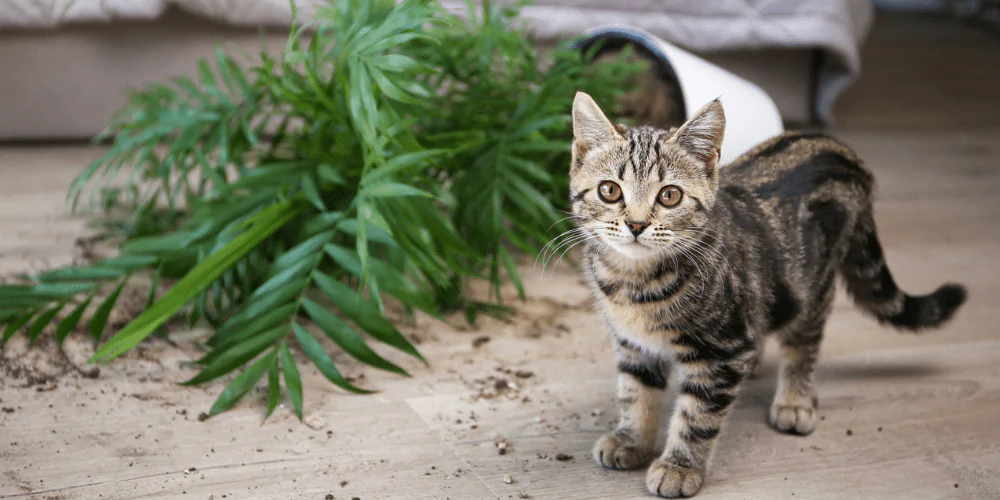
Vet tips for helping with kitten regret

Dr Scott Miller
15 February 2024 | 7 minutes read
It’s easy to fall in love with a kitten. That gentle purring, the cheeky personality, those tiny paws and big eyes. But what happens when that initial euphoria starts to wear off and worry seeps in?
Dr Scott Miller is here to help with expert advice on what to do if you’re feeling regret about getting your kitten.
- Before getting a kitten, do your research
- Is it normal to regret getting a kitten?
- How to cope with anxiety over your kitten

Before getting a kitten, do your research
If you’re only at the early stage of deciding whether to get a kitten and are worried about future regret, now’s the time to do your research.
Having cat parenting knowledge will hopefully give you more confidence going into your new caregiving role. After all, having a cat is a lifelong commitment – we’re talking an average of 14 years, though some cats can live to around 20 years old.
Some things to think about before choosing your kitten include:
- Breed – certain breeds have different temperaments, energy levels, and enrichment needs. Though you may like the look of a certain breed, is it the right personality fit for your family?
- Lifestyle – does having a cat fit into your lifestyle? Will you be at home to spend quality time with them and keep them entertained?
- Cost – it’s not enough to just plan for those initial kitten purchases like food bowls and cat trees. Can you afford regular, ongoing costs such as food, litter, cat insurance, preventative treatments, plus regular vet checkups and vaccinations?
- Pet sitting and care – who will look after your feline if you go away on holiday?

Is it normal to regret getting a kitten?
It’s completely normal to feel overwhelmed with being a kitten parent – and it doesn’t mean you don’t love them.
You’re both going through a big life change, which includes a period of settling in and adjusting. Many reasons can cause you to feel stressed or anxious about your new kitten.
> Changes to your lifestyle
You’ve committed to a big responsibility by introducing a cat into the family. Now you’re:
- Budgeting for the costs that come with everyday kitten care and wellbeing
- Having to allow plenty of time in your day to play and entertain your feline
- Planning your schedule around caring for your kitten and not leaving them alone for too long while they’re little
- Making arrangements for kitten care if you need to go away (and no doubt still feeling anxious about leaving them)
> Feline health problems
Kittens have delicate stomachs and you may be dealing with some tummy upset when they first come home. After all, they’ve had a change of home and are around new people, sights, sounds, and smells.
You might also have general worries about managing other illnesses or health concerns that your feline may develop.
> Damage to the house
Ah, those claws! They get put to good use by your kitten. Soon you may be finding claw and scratch marks all over the house, including your favourite furniture.
As your kitten is exploring, you may experience things being unwittingly knocked over. Or household items and decor becoming your cat’s new playthings.
Plus there may be some mess to clean up if your kitten is poorly or is showing signs of stress like urine marking.

How to cope with anxiety over your kitten
There are lots of other kitten parents out there going through the same struggles, so don’t feel guilty about finding it tough.
Here are a few suggestions to help you get through those challenging stages of early kittenhood.
> Set up a kitten-proof house
To keep your kitten safe and help them settle, here are a few things you can do in your home:
- Set up a quiet space with plenty of blankets, making sure they have easy access to food and water. Their litter tray can be kept in the same room, just keep it a good distance away from their bed and bowls.
- Put any breakable ornaments away, not just out of reach – you never know where your little adventurer may end up!
- Get rid of any plants that are toxic to cats and choose some feline-friendly alternatives to replace them.
- Create of plenty high-up areas that your kitten can start using once they’re big enough.
Here’s a handy kitten checklist of some key things to think about getting before you bring them home.
To stop your kitten’s unwanted scratching on furniture and carpets, make sure to give them the right cat tree/scratch post. This will ideally include:
- Finding a post with a material they like to scratch
- Giving them a mixture of scratching angles
- Putting the post somewhere convenient for them
- Using treats to make the scratch post fun and rewarding to use
> Speak to your vet
It’s quite common for kittens to have upset stomachs. Your vet can prescribe probiotics to help it settle down while your kitten naturally settles into their new home and routine.
Don’t forget to make the most of any free vet video calls your kitten insurance provider offers. They can talk through any medical worries you have about your kitten right from the comfort of your home.
Making sure your kitten has all of their primary vaccinations and keeping up with their boosters can help to reduce the risk of common illnesses.
> Learn how to communicate with your cat
You may not speak meow but there are other ways to communicate with your kitten!
Some of the ways to understand what they’re trying to tell you include:
- Reading your cat’s body language
- Recognising different types of cat meowing and vocalisations
- Learning how to spot the signs of stress in your cat so you can change things sooner
> Pick up tips from other cat parents
Joining online pet groups and forums can be a great way to get suggestions and help from other cat parents.
Plus, it can feel good to talk to people who are going through similar challenges raising their kittens. Just remember that what works for one cat may not work for another – and never negatively compare yourself to what others are doing.
> Find trusted cat care
It’s natural to feel anxious about leaving a cat of any age. Having a few different trusted options to look after your feline when you go away can help ease that anxiety.
These could be:
- A friend or family member whom your cat is comfortable with and can stay in your house with them. That way your cat can stay in familiar surroundings while you’re away.
- A local cattery you have researched and visited in person to meet the staff and check out the facilities. Some places will send regular picture updates to you for added peace of mind.
> Work with a qualified behaviourist
Sometimes you need some professional help to figure out what’s causing unwanted behaviour in your kitten.
Reach out to a qualified feline behaviourist who can support you through positive reinforcement techniques. And remember to check your pet insurance as these sessions may be covered under your policy.
> Give yourself and your kitten time
Always remember that, like us, cats are individuals with unique personalities. You may not have an instant bond but with time, love, and attention, you can grow close to your four-legged pal.
There’s also no set time for them to get settled in. So don’t feel pressured by the ‘we should be at this stage now’ way of thinking. Work through things a day at a time and turn to those around you for support if you have any setbacks.


